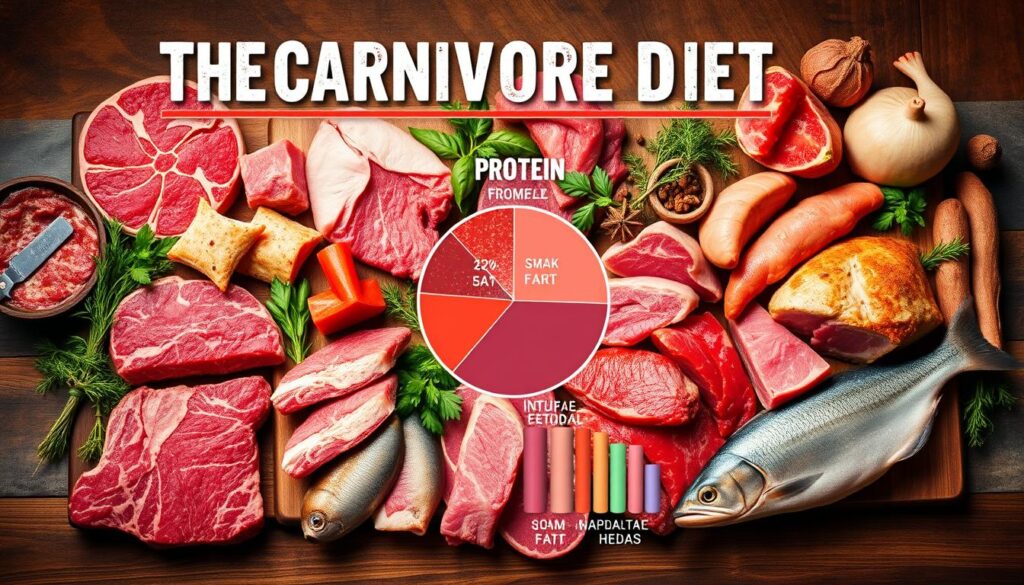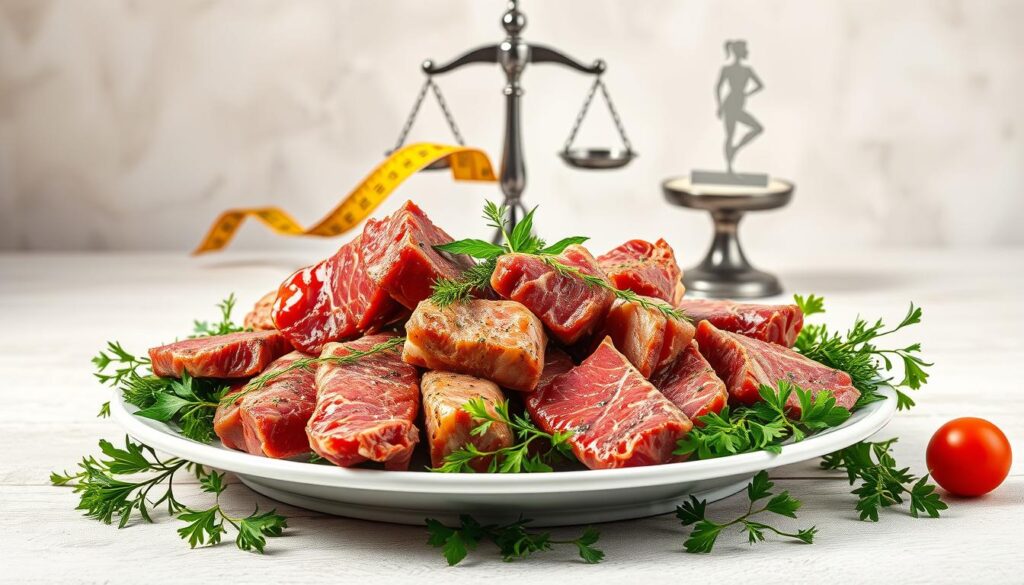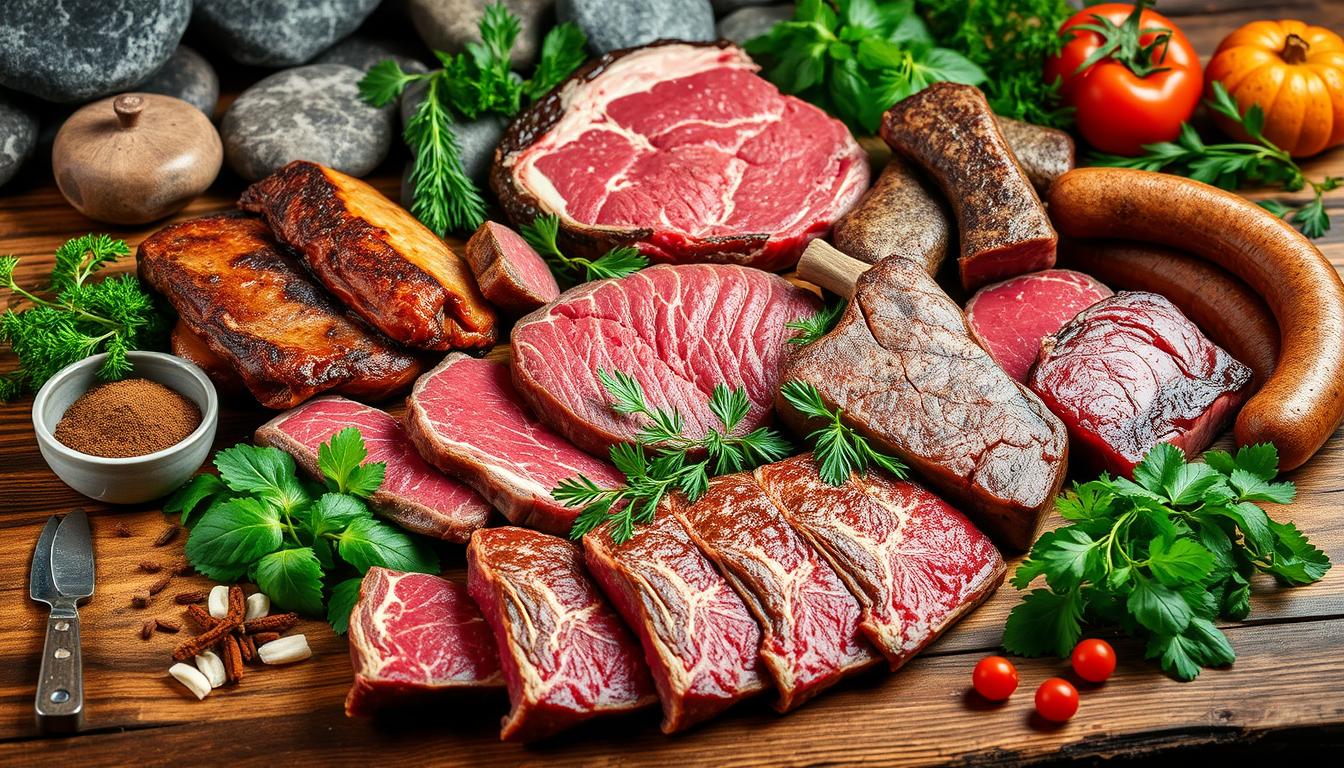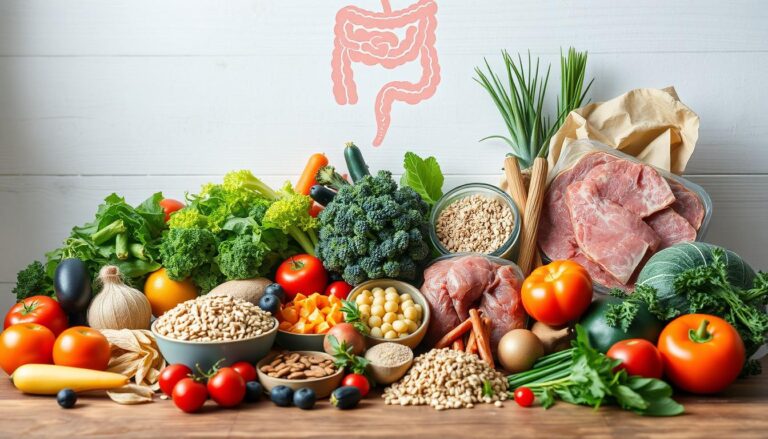The Carnivore Diet: What You Need to Know
Ever feel stuck by endless diet rules? The meat-based diet might be your answer. It’s a bold move that shakes up what we know about eating right.
The animal-based diet is more than just a trend. It’s backed by orthopedic surgeon Shawn Baker and comedian Joe Rogan. This diet boils down to just meat and animal products.
This diet is unlike any other. It cuts out carbs, fruits, veggies, grains, and plants. It only focuses on animal proteins and fats.
Table of Contents
Understanding the Carnivore Diet
The carnivore diet is a strict diet that goes against what most people think about eating. It focuses on high protein and has become popular, but it also raises many questions among health experts.
This diet has roots in history, challenging old ideas about food. It’s based on the idea that our ancestors mainly ate meat.
Historical Origins
The idea of the carnivore diet started with a Scottish doctor named John Rollo in the late 1700s. He was the first to suggest eating meat to help with diabetes.
“Nutrition is not about following trends, but understanding our biological requirements.” – Nutrition Research Perspective
Basic Principles and Rules
- Eliminate all plant-based foods
- Consume exclusively animal products
- Focus on high-quality protein sources
- Aim for zero carbohydrate intake
Scientific Background
While the idea of a low carb high fat diet has some science backing, the carnivore diet’s research is scarce. Most of what we know comes from personal stories, not scientific studies.
| Diet Characteristic | Carnivore Diet Approach |
|---|---|
| Protein Intake | Extremely High |
| Carbohydrate Intake | Zero |
| Fat Consumption | Primarily from Animal Sources |
| Food Variety | Strictly Animal Products |
The ketogenic diet is similar but allows for some plant-based fats and a bit of carbs. Knowing the differences is key for those thinking about trying this diet.
What You Can Eat on a Meat-Based Diet
The carnivorous eating plan focuses on animal products only. It’s a diet that centers on high-quality animal proteins and related items. These provide the essential nutrients you need.
Primary Protein Sources
Your diet will include a variety of meats:
- Beef (preferably grass-fed)
- Chicken
- Pork
- Lamb
- Turkey
- Duck
- Fish and seafood
Acceptable Animal Products
There are more animal-based foods you can eat:
- Eggs
- Bone marrow
- Bone broth
- Organ meats
- Animal fats like lard
Dairy Options and Limitations
Dairy choices are limited to low-lactose options:
- Heavy cream
- Hard cheeses
- Butter
“Nutrition is about quality, not just quantity” – Carnivore Diet Advocates
Stick to water as your main drink. You can also have salt, pepper, and zero-carb seasonings to add flavor to your meals.
Foods to Eliminate
Starting a meat-based diet means knowing what to cut out. The carnivore diet is very strict. It removes whole food groups from your diet.
On a zero carb diet, you must avoid certain foods. Here’s what you need to skip:
- All plant-based foods
- Fruits and vegetables
- Grains and legumes
- Nuts and seeds
- Processed foods
Dairy can be tricky. Milk and soft cheeses are usually off-limits. But, some people on this diet might eat hard cheeses or butter.
“A carnivore diet means your plate consists exclusively of animal products.” – Nutrition Experts
Here are some drinks to avoid:
- Alcoholic drinks
- Sugary beverages
- Sodas
- Energy drinks
- Coffee (for strict adherents)
Removing these foods makes the carnivore diet stand out. It’s tough, but some believe it can bring health benefits.
Nutritional Composition and Macronutrients
The carnivore diet is a strict approach to eating, focusing on lots of protein. It has a unique mix of nutrients. Understanding this diet’s nutritional makeup is key.

Protein Content Insights
Protein is at the heart of the carnivore diet. Studies show people eat a lot of protein, about 0.4 to 0.6 grams per pound of body weight. A 3-month study found that eating this much protein led to weight loss and less body fat.
- Protein intake: 0.4-0.6 grams per pound of body weight
- Protein calories: 4 calories per gram
- Typical protein consumption: 15-30% of total calories
Fat Ratios and Composition
The diet focuses on a lot of fat, making up 70-80% of calories. This is similar to a ketogenic diet but with a stronger animal food focus.
- Fat calories: 9 calories per gram
- Recommended fat intake: 1.5-2x grams compared to protein
- Primary fat sources: Saturated animal fats
Zero-Carb Methodology
The diet cuts out carbs completely, setting it apart from other diets. It allows for 0-10% of calories from carbs, meaning 0-25 grams of carbs a day.
“The carnivore diet forces metabolic adaptation through complete carbohydrate elimination.” – Nutrition Researchers
Some benefits of the diet include better blood pressure and less belly fat. But doctors worry about its long-term effects, like lack of nutrients and heart risks.
Potential Health Benefits
The carnivore diet is getting more attention for its health benefits. People say it can improve both physical and mental health.
Some benefits of the carnivore diet include:
- Enhanced weight loss through increased protein satiety
- Improved mental clarity and mood stability
- Potential reduction in chronic inflammation
- Better blood sugar control
- Increased energy levels
Weight management is a big plus of this diet. The high protein makes you feel full longer. This can lead to eating fewer calories. Studies show people on this diet often lose a lot of weight.
“The carnivore diet may provide unique metabolic advantages for those struggling with traditional weight loss approaches.” – Nutrition Research Institute
Improvements in mental health are also reported. Some people say they feel:
- Reduced anxiety symptoms
- Enhanced cognitive function
- More stable emotional states
| Potential Benefit | Possible Mechanism |
|---|---|
| Weight Loss | High protein satiety, ketosis promotion |
| Inflammation Reduction | Elimination of processed carbohydrates |
| Mental Clarity | Stable blood sugar levels |
Note: These benefits are mostly based on personal experiences and need more scientific study to be confirmed.
It’s important to talk to a doctor before making big changes to your diet. The long-term effects of the carnivore diet are not fully known. Results can vary from person to person.
Weight Loss and the Carnivore Diet
The carnivore diet offers interesting insights into weight loss. It’s a strict diet that promises big changes through unique nutrition.

Fat Burning Mechanisms
This diet works by cutting out carbs completely. It makes your body use fat for energy, similar to a ketogenic diet.
- High protein consumption increases metabolic rate
- Eliminates sugar and processed carbohydrate intake
- Promotes natural fat burning processes
Metabolic Changes
Switching to a carnivore diet brings big changes in how your body works. Studies on over 2000 people showed big drops in BMI from eating only animal foods.
“The carnivore diet transforms how your body processes nutrients and burns energy”
| Metabolic Factor | Carnivore Diet Impact |
|---|---|
| Insulin Sensitivity | Improved |
| Fat Burning Rate | Increased |
| Metabolic Flexibility | Enhanced |
While it looks good for losing weight, think about keeping it up long-term. Always talk to a doctor before making big diet changes.
Health Risks and Concerns
The carnivore diet has become popular, but it comes with big risks. These risks are not just about food choices. They can affect your health for a long time.
The main health risks of this diet include:
- Increased risk of heart disease due to high saturated fat intake
- Potential nutrient deficiencies from eliminating plant-based foods
- Elevated cholesterol levels
- Digestive system complications
Nutritional research shows big concerns about the carnivore diet. A study found that people experienced big metabolic changes, but not all were good.
“Extreme dietary restrictions can create unexpected health challenges” – Nutrition Experts
The diet’s meat focus raises big health worries over time. Your body needs many nutrients that this diet might not give you.
| Potential Health Risk | Possible Consequence |
|---|---|
| High Saturated Fat Intake | Increased LDL Cholesterol |
| Fiber Deficiency | Digestive Complications |
| Nutrient Limitations | Vitamin and Mineral Deficiencies |
Doctors say the risks of the carnivore diet are more than just short-term. Long-term, it could lead to serious health problems. These include kidney stress and higher cancer risks from eating processed meat.
Before trying this diet, talk to a doctor. They can give advice based on your health and what you need to eat.
Nutrient Deficiencies and Considerations
Looking into the carnivore diet shows us important gaps in nutrition that could affect our health. Meat is rich in nutrients, but this diet might miss out on some. This could be a big problem for our overall health.
It’s key to know about the nutritional gaps if you’re thinking about this diet. Not eating plant-based foods can lead to missing out on important nutrients.
Missing Essential Nutrients
The carnivore diet might not have all the nutrients we need. This is because we’re not eating a variety of foods:
- Vitamin C – Crucial for immune function
- Magnesium – Supports muscle and nerve health
- Fiber – Essential for digestive wellness
- Calcium – Important for bone strength
- Potassium – Regulates heart and muscle function
Supplementation Strategies
To fix these nutrient gaps, we need to use supplements wisely. Here are some strategies:
- Use high-quality multivitamin supplements
- Incorporate organ meats for micronutrient density
- Select grass-fed and wild-caught animal products
- Consult nutrition professionals for personalized guidance
“Variety within animal products is key to minimizing nutrient gaps” – Nutrition Experts
Planning is important for the carnivore diet. Wild-caught fish, egg yolks, and beef liver are full of vitamins like D, E, and B-complex. Dairy can help with calcium.
It’s important to watch how your body reacts and get regular health checks when you’re on such a strict diet.
Getting Started on the Diet
Starting a meat-based diet is a big step. It’s not just about changing what you eat. It’s a lifestyle change that needs commitment and planning.
- Consult with a healthcare professional before making radical dietary changes
- Gradually eliminate plant-based foods from your current diet
- Source high-quality, grass-fed meats and wild-caught fish
- Prepare for possible initial adaptation challenges
Start by removing processed foods from your diet. Then, cut out grains and legumes. Finish by eliminating all plant-based foods. This gradual approach helps your body adjust better to the diet.
“The carnivore diet is not just a diet, it’s a return to our ancestral nutritional roots.” – Carnivore Diet Advocate
Tracking your nutrition is important during this time. Watch how your body reacts, your energy levels, and overall health. Drinking plenty of water and considering electrolyte supplements is key to support your body’s transition.
| Dietary Phase | Duration | Focus |
|---|---|---|
| Initial Transition | 30-45 days | Eliminate processed foods |
| Intermediate Adaptation | 45-60 days | Remove grains and legumes |
| Full Carnivore | 60-90 days | Animal products only |
Success on the carnivore diet comes from knowing your nutritional needs. Listen to your body, adjust your protein and fat intake, and be patient with the adaptation process.
Comparing to Other Low-Carb Diets
Exploring low-carb high fat diets, it’s key to know the differences between carnivore and keto diets. Each diet has its own way of looking at nutrition, making them unique.
The carnivore diet is the most strict low-carb diet. It doesn’t allow carbs at all, unlike keto which lets you have 5-10% carbs. You only eat animal-based proteins and fats.
- Keto Diet: Allows 20-50g carbs daily
- Carnivore Diet: Zero carbohydrate intake
- Protein Sources: Both diets emphasize animal proteins
- Fat Consumption: High fat ratios in both approaches
| Diet Feature | Keto Diet | Carnivore Diet |
|---|---|---|
| Carbohydrate Intake | 20-50g daily | 0g |
| Food Variety | Includes vegetables, some fruits | Meat only |
| Calorie Range | 1,600-2,200 (women) | 1,600-2,200 (women) |
Your health goals will help decide which diet is best for you. Keto offers more flexibility, while carnivore is a strict approach.
“Not all low-carb diets are created equal. Understanding your body’s unique needs is key to dietary success.” – Nutrition Expert
Both diets have risks. Carnivore might cause nutrient deficiencies, and keto can affect your metabolism. Always talk to a healthcare professional before starting a strict diet.
Conclusion
Your journey with the carnivore diet needs careful thought. Some people say it helps them lose weight and feel more energetic. But, there are big health risks to consider.
Studies show that not eating plants can lead to missing out on important nutrients. This could cause serious health problems in the long run.
The carnivore diet can increase heart disease risk due to too much saturated fat. It also might raise cancer risks because of eating too much red meat. The American Heart Association says to limit saturated fats, which goes against this diet.
Doctors always talk about the need for a balanced diet with lots of different nutrients. Your health is more important than any diet. Always talk to a doctor before starting a new diet.
Good nutrition means eating a variety of foods, not just meat. The carnivore diet might seem good at first, but the risks are too high.


